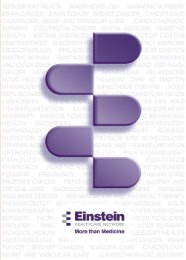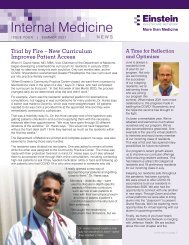OB/GYN Newsletter Summer 2021
You also want an ePaper? Increase the reach of your titles
YUMPU automatically turns print PDFs into web optimized ePapers that Google loves.
continued from page 1<br />
Adapting to Change<br />
retirement. He has played a significant role in the education and mentoring of our<br />
residents and his contributions to the field are beyond measure. He will be greatly<br />
missed. I would also like to offer a heartfelt congratulations to our graduating<br />
residents. We wish you the best in your future fellowships and careers and ask<br />
you to please stay in touch. You’ll always be welcomed as a member of our<br />
Einstein family.<br />
Warmly,<br />
David Jaspan, DO, FACOOG<br />
Chair, Department of Obstetrics and Gynecology<br />
Einstein Healthcare Network<br />
215-456-8438 | JaspanD@Einstein.edu<br />
Editor’s Note: Graduating<br />
residents can stay in touch by<br />
registering with Einstein Alumni<br />
Connect – Einstein’s new alumni<br />
networking tool. Visit the site at<br />
alumni.einstein.edu<br />
2<br />
Medication-Assisted Treatment Improving<br />
Outcomes for Moms and Babies<br />
Supported by state grant funding, the Department of<br />
Obstetrics and Gynecology at Einstein has been advancing<br />
plans to launch a medication-assisted treatment program<br />
designed to address the specialized needs of pregnant<br />
women since the beginning of <strong>2021</strong>.<br />
“There’s good evidence showing patients who receive<br />
medication-assisted treatment do better in pregnancy,” says<br />
Carlene Quashie, MD, who, along with Amanda Schieler, MD,<br />
is leading the charge to get the program up and running.<br />
“Patients are more likely to keep prenatal appointments, less<br />
likely to overdose, and are better able to care for themselves.<br />
It also helps the developing fetus.”<br />
The program was developed to address the growing problem<br />
of opioid use disorder in the general population, including<br />
pregnant patients. The Department of Pediatrics was also<br />
seeing an increase in the number of newborns experiencing<br />
withdraw symptoms without the <strong>OB</strong> providers having any prior<br />
knowledge of maternal opioid use during the pregnancy.<br />
“We backtracked and realized we could help reduce or<br />
prevent the incidence of neonatal abstinence syndrome<br />
if we provided intervention for pregnant women prior to<br />
delivery,” explains Dr. Quashie. “In addition, there is a direct<br />
relationship with maternal opioid use and maternal mortality<br />
in the post-partum period.”<br />
To ensure the program’s success, Drs. Quashie and Schieler<br />
set out to develop training guidelines for clinicians and get<br />
input from other departments before launching the program.<br />
“We had a number of attending physicians get trained and<br />
certified to write prescriptions for buprenorphine, the drug<br />
used to treat opioid addiction,” says Dr. Schieler. “We’ve also<br />
reached out to departments already doing this type of work<br />
for feedback and buy-in.”<br />
Patients who admit to opioid use during prenatal care<br />
visits are informed about the program. For those who are<br />
interested, a consultation is scheduled with Dr. Quashie or<br />
Dr. Schieler and a social worker is brought in to initiate the<br />
patient’s medical and drug use history.<br />
“We provide interested patients with the education they<br />
need to take the next step,” says Dr. Quashie. “Initiation<br />
of medication can’t take place until the patient has been<br />
off opioids for at least 12-24 hours. If they decide to<br />
participate, we bring them back the following day, provide<br />
training on taking their medication and schedule a follow-up<br />
appointment one week later.”<br />
“When a patient has their baby, we schedule them for a<br />
post-partum appointment and help them with insurance<br />
clearance before discharging them from the hospital,” adds<br />
Dr. Schieler. “The post-partum period can get hectic and<br />
it’s a time when patients may be more likely to drop out of<br />
the program. Once they’re released from our care, we also<br />
refer them to the outpatient medicine service where they can<br />
continue medication assisted therapy.”<br />
The medication assisted treatment program is currently in<br />
its infancy and is offered at Einstein Philadelphia, as well<br />
as the Rising Sun practice location. Patient outcomes are<br />
being tracked and the program is hoping to expand to other<br />
locations by the end of the year.<br />
A program led by Dr. Schieler (left) and Dr. Quashie (right), is<br />
working to improve outcomes for mothers and their babies.


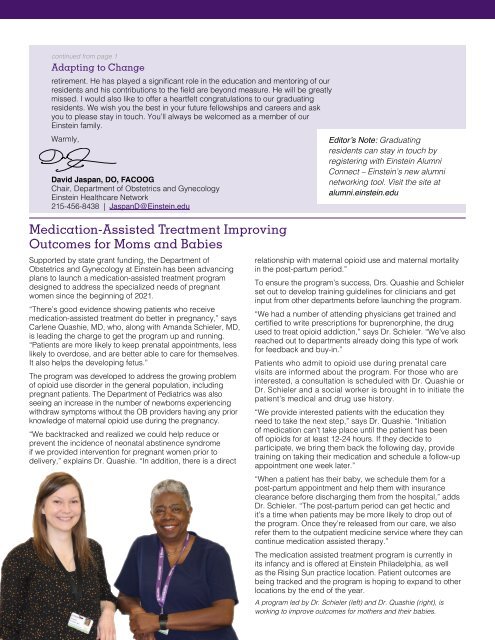
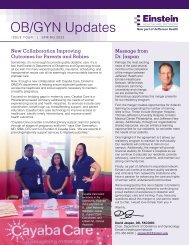
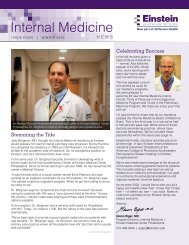
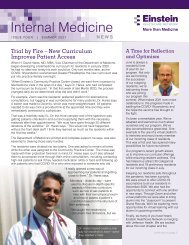
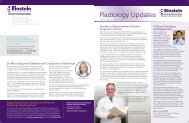

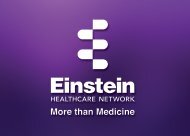
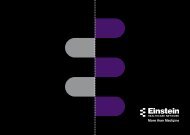
![Donor_Impact_Report_2019[1]](https://img.yumpu.com/65872065/1/186x260/donor-impact-report-20191.jpg?quality=85)
